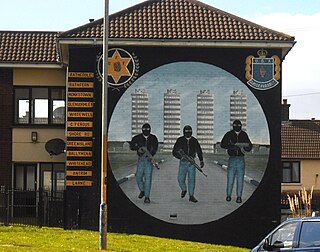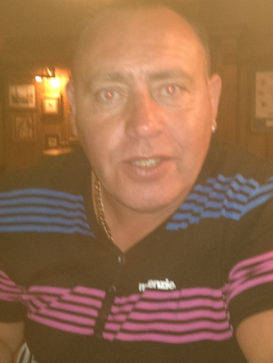Related Research Articles

John Adair, better known as Johnny Adair or Mad Dog Adair, is a Northern Irish loyalist and the former leader of the "C Company", 2nd Battalion Shankill Road, West Belfast Brigade of the Ulster Freedom Fighters (UFF). This was a cover name used by the Ulster Defence Association (UDA), a loyalist paramilitary organisation. In 2002 Adair was expelled from the organisation following a violent internal power struggle. Since 2003, he, his family and a number of supporters have been forced to leave Northern Ireland by the mainstream UDA.

The Ulster Defence Association (UDA) is an Ulster loyalist paramilitary group in Northern Ireland. It was formed in September 1971 as an umbrella group for various loyalist groups and undertook an armed campaign of almost 24 years as one of the participants of the Troubles. Its declared goal was to defend Ulster Protestant loyalist areas and to combat Irish republicanism, particularly the Provisional Irish Republican Army (IRA). In the 1970s, uniformed UDA members openly patrolled these areas armed with batons and held large marches and rallies. Within the UDA was a group tasked with launching paramilitary attacks that used the cover name Ulster Freedom Fighters (UFF) so that the UDA would not be outlawed. The British government proscribed the UFF as a terrorist group in November 1973, but the UDA itself was not proscribed until August 1992.
A loyalist feud refers to any of the sporadic feuds which have erupted almost routinely between Northern Ireland's various loyalist paramilitary groups during and after the ethno-political conflict known as the Troubles broke out in 1969. The feuds have frequently involved conflicts between and within the Ulster Defence Association (UDA) and the Ulster Volunteer Force (UVF) as well as, later, the Loyalist Volunteer Force (LVF).
The Shoukri brothers are a pair of Northern Irish loyalist paramilitaries. Andre Khalef Shoukri was born in 1977, the son of a Coptic Christian Egyptian father and a Northern Irish mother. He was alleged to have taken over the north Belfast Ulster Defence Association (UDA) leadership. In July 2003 he received a two-year prison sentence for unlawful possession of a gun and received a nine-year sentence for various crimes in 2007. Ihab Shoukri, who was the older brother by three years, died in 2008.

John Gregg was a senior member of the UDA/UFF loyalist paramilitary organisation in Northern Ireland. In 1984, Gregg seriously wounded Sinn Féin president Gerry Adams in an assassination attempt. From the 1990s until he was shot dead in 2003 by rival associates, Gregg served as brigadier of the UDA's South East Antrim Brigade. Widely known as a man with a fearsome reputation, Gregg was considered a "hawk" in some loyalist circles.

John "Jackie" McDonald is a Northern Irish loyalist and the incumbent Ulster Defence Association (UDA) brigadier for South Belfast, having been promoted to the rank by former UDA commander Andy Tyrie in 1988, following John McMichael's killing by the Provisional IRA in December 1987. He is also a member of the organisation's Inner Council and the spokesman for the Ulster Political Research Group (UPRG), the UDA's political advisory body.
Tommy Kirkham is a Northern Ireland loyalist political figure and former councillor. Beginning his political career with the Democratic Unionist Party, he was then associated with the Ulster Defence Association (UDA) and the Ulster Political Research Group although he has since been expelled from both groups. He was a former deputy mayor of Newtownabbey and sat on Newtownabbey Borough Council as an Independent Loyalist.

The UDA South East Antrim Brigade was previously one of the six brigades of the Ulster Defence Association (UDA) and are heavily involved in the drug trade. It is claimed they control "100%" of an illegal drugs network in south-east County Antrim, Northern Ireland. A mural in support of the group lists its areas of activity as being Rathcoole, Rathfern, Monkstown, Glengormley and Whitewell, all of which are part of Newtownabbey, as well as Carrickfergus, the Shore Road, Greenisland, Ballymena, Whitehead, Antrim and Larne. A newer mural in the Cloughfern area of Newtownabbey and flags have updated the areas to include Ballycarry, Ballyclare, the rural hinterland of Ballymena called 'Braidside' and despite not being in County Antrim, the town of Newtownards. The Guardian has identified it as "one of the most dangerous factions". The Irish News described the brigade as 'powerful' and at one time being 'the most bloody and murderous gang operating within the paramilitary organisation'. Since 2007 the South East Antrim Brigade has operated independently of the UDA following a fall-out.
Alex Kerr is a Northern Irish former loyalist paramilitary. Kerr was a brigadier in the Ulster Defence Association (UDA)'s South Belfast Brigade. He is no longer active in loyalism.
William Samuel "Mo" Courtney is a former Ulster Defence Association (UDA) activist. He was a leading figure in Johnny Adair's C Company, one of the most active sections of the UDA, before later falling out with Adair and serving as West Belfast brigadier.
William McFarland, also known as "the Mexican", is a Northern Irish loyalist paramilitary. He was a leading figure in the Ulster Defence Association (UDA), he had served as head of the North Antrim and Londonderry East Tyrone Brigade of the group.
William Elliot was a former Northern Irish loyalist who served as brigadier of the Ulster Defence Association's (UDA) East Belfast Brigade in the 1980s.
Jim Spence is a Northern Irish former loyalist activist. Spence became notorious for his time in the Ulster Defence Association (UDA), serving two spells in charge of the West Belfast Brigade. Spence is a native of the Woodvale area of Belfast's Shankill Road.
The UDA West Belfast Brigade is the section of the Ulster loyalist paramilitary group, the Ulster Defence Association (UDA), based in the western quarter of Belfast, in the Greater Shankill area. Initially a battalion, the West Belfast Brigade emerged from the local "defence associations" active in the Shankill at the beginning of the Troubles and became the first section to be officially designated as a separate entity within the wider UDA structure. During the 1970s and 1980s the West Belfast Brigade was involved in a series of killings as well as establishing a significant presence as an outlet for racketeering.

William John Boreland was a Northern Irish footballer and loyalist activist. He came to prominence in the early years of the 21st century when he served as leader of the North Belfast Brigade of the Ulster Defence Association (UDA) and, as such, one of the six commanders of the movement as a whole. Boreland was killed in a shooting at his Belfast home in 2016.
James Millar – commonly known as "Sham" – is a Northern Irish loyalist paramilitary. Millar was a leading member of the West Belfast Brigade of the Ulster Defence Association (UDA) until 2003 when he was one of a number of dissident members forcibly expelled from the group.
Gary Smyth is a Northern Irish former loyalist paramilitary. Smyth was an active member of the West Belfast Brigade of the Ulster Defence Association during the Troubles. He was known by the nickname "Smickers" throughout his paramilitary career, although he was also sometimes called "Chiefo".

Jackie Coulter was a member of a loyalist paramilitary from Belfast, Northern Ireland who held the rank of lieutenant in the Ulster Defence Association (UDA). He was killed by the rival loyalist paramilitary organisation the Ulster Volunteer Force (UVF), as the result of a feud within loyalism.
John Bunting is a Northern Irish loyalist paramilitary leader and activist. As of 2014 Bunting is the head of the North Belfast Brigade of the Ulster Defence Association (UDA) and thus a member of the Inner Council that controls the organisation.

The UDA South Belfast Brigade is the section of the Ulster loyalist paramilitary group, the Ulster Defence Association (UDA), based in the southern quarter of Belfast, as well as in surrounding areas. Initially a battalion, the South Belfast Brigade emerged from the local "defence associations" active in the city at the beginning of the Troubles. It subsequently emerged as the largest of the UDA's six brigades and expanded to cover an area much wider than its initial South Belfast borders.
References
- ↑ Henry McDonald & Jim Cusack, UDA – Inside the Heart of Loyalist Terror Penguin Ireland, 2004, p. 346
- ↑ Henry McDonald & Jim Cusack, UDA – Inside the Heart of Loyalist Terror Penguin Ireland, 2004, p. 346
- ↑ McDonald & Cusack, UDA, p. 327
- ↑ McDonald & Cusack, UDA, p. 334
- ↑ McDonald & Cusack, UDA, p. 335
- 1 2 Wood, Ian S., Crimes of Loyalty: A History of the UDA, Edinburgh University Press, 2006, p. 278
- ↑ McDonald & Cusack, UDA, p. 345
- ↑ McDonald & Cusack, UDA, p. 359
- ↑ OPINION: The question now is what will happen to the gang?
- 1 2 Wood, Crimes of Loyalty, pp. 304–305
- ↑ Wood, Crimes of Loyalty, p. 280
- ↑ David Lister & Hugh Jordan, Mad Dog: The Rise and Fall of Johnny Adair and 'C' Company, Mainstream, 2004, p. 310
- ↑ Wood, Crimes of Loyalty, p. 304
- ↑ Paramilitaries feud over sex and money as Adair leaves behind a power vacuum
- ↑ LVF drugs ring `smashed'; UDA feud lingers on
- ↑ "Nothing or nobody is certain any more". Archived from the original on 18 March 2012. Retrieved 14 June 2011.
- ↑ Barnes, Ciaran (14 September 2014). "UDA Call an 'AGM' to End Faction Feuds". Belfast Telegraph (subscription required). Archived from the original on 28 March 2015. Retrieved 18 September 2014.
- ↑ Ainsworth, Paul (15 October 2018). "Holy Cross dispute UDA leader Jim Simpson dies from cancer". The Irish News. Retrieved 15 October 2018.